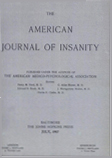THE BULGARIAN TREATMENT OF PARKINSONISM WITH SPECIAL REFERENCE TO ITS EFFECT ON MENTAL SYMPTOMS
Abstract
We have used belladonna root extract in the treatment of parkinsonism over a sufficient length of time and in a series of cases sufficiently large for us to draw these conclusions:
1. The mild mental symptoms in most of these patients were materially benefitted.
2. The most striking results were obtained in several bedridden cases, who by the use of the drug, were enabled to walk, dress and feed themselves.
3. In all patients there was a return of symptoms when the drug was withdrawn.
4. In this larger series, our results were not quite as good as they were in cases previously reported by us.
5. The degenerative type of the disease did not respond to the treatment as well as the postencephalitic variety, nor did that type tolerate the drug as well.
6. It is our opinion that this drug is decidedly more efficacious as a palliative treatment than the single alkaloids or other drugs which have been used in this disease.
Acknowledgment is hereby given to our co-workers in the Department of Neuropsychiatry at the Medical College of Virginia, to the superintendents and clinical directors of the Central State Hospital and the Southwestern State Hospital in Virginia, and to several colleagues who treated several cases in this series.
Access content
To read the fulltext, please use one of the options below to sign in or purchase access.- Personal login
- Institutional Login
- Sign in via OpenAthens
- Register for access
-
Please login/register if you wish to pair your device and check access availability.
Not a subscriber?
PsychiatryOnline subscription options offer access to the DSM-5 library, books, journals, CME, and patient resources. This all-in-one virtual library provides psychiatrists and mental health professionals with key resources for diagnosis, treatment, research, and professional development.
Need more help? PsychiatryOnline Customer Service may be reached by emailing [email protected] or by calling 800-368-5777 (in the U.S.) or 703-907-7322 (outside the U.S.).



